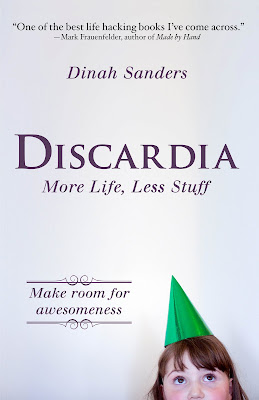
Back in 2002, author Dinah Sanders wrote: "I've decided to invent a new holiday called Discardia. It takes place in the time between the Solstices & Equinoxes and their following new moons. Discardia is celebrated by getting rid of stuff and ideas and habits you no longer need." Dinah's been writing about Discardia ever since, and now she's published a book on the subject.
Although the book is structured around things you might do at each of the four Discardias each year — we've got one coming up, running from March 19–22 — each chapter could be read on its own, providing inspiration in the area where you want that inspiration.
Here are just a few of my favorite bits:
Weeding out things that no longer need to be in your home — that juicer you never use, the old beloved decorative item that has morphed somewhere along the way into merely an object to dust — can leave you uplifted and energized and draw your attention back to those things that do still matter to you.Full disclosure: I know and like Dinah, and I'm quoted briefly in this book — which I purchased twice, in both iBook and paperback formats. For some reason, reading the paperback worked better for me.
When you are uncluttering or sorting through old things ... allow some items to go into a Not Sure container. In a perfect world, every single thing is clear and unladen with emotional baggage, but I don't live there and I bet you don't, either. Don't try to force an airtight system onto a far more complicated reality. Leave yourself a little slack. Keep moving on the easier choices to get your 90% progress while letting the 10% weird ones bide a little time to get less weird.
Many people engage in some kind of projects that involve supplies. Knitting, carpentry, building Linux servers, whatever. When one has a hobby, somehow, through a magical process, the supplies for that hobby proliferate beyond reasonable bounds. ... Fill up a bag with your excess craft crud. Depending on the boot and the stuff, give it to a school or a charity or throw it in the dumpster, which may be where you rescued it from in the first place.
Remember you can keep a digital photo of a meaningful inscription, or a page on which you are quoted, and not the book itself.
How many things in your house purely represent your affection for someone but which, as objects, you would otherwise not choose to have? That slightly tacky jewelry from your deceased great-aunt that you never wear but which you wouldn't want to hurt her posthumous feelings by donating to charity?
To be more productive and rewarded, don't try to do more at once; instead, choose your actions well and do what you are doing with greater focus.
If you gut strongly says "no" to something, find a way not to have your mouth say "yes."
I bet you have a tool you use every week — maybe every day — that bugs you. It's adequate, which is why you haven't replaced it, but it is suboptimal and it slows down your say or doesn't put you in a good mood. Replace this tool with a better version and learn what a difference truly well-designed things can make.
When we re-examine our belongings after self-reflection, we begin to see how letting go is deeply intertwined with being honest with ourselves. ... Look at the things you've had in front of you for so long that you've stopped seeing them. Do they still match who you are? ... Acknowledge your beginnings and accept when you've grown beyond them. Be true to who you've become.

No comments:
Post a Comment